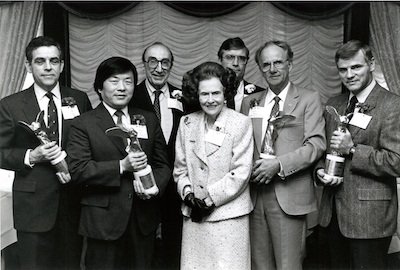
Philip Leder, Susumu Tonegawa, Michael DeBakey, Mary Lasker, James Fordyce, Mogens Schou, Leroy Hood
Philip Leder is a professor emeritus and former chair of the Department of Genetics at Harvard Medical School. He was the recipient of the 1987 Albert Lasker Basic Medical Research Award for his studies of the genetics of antibody diversity, which led to his important discovery that cancer can result from a disruption in gene regulation.
While he was Department chair at Harvard, Leder was interviewed by Richard Cohen, an Emmy-award-winning journalist. In this interview, Leder talks about the role of passion and optimism in research, of how the advent of internet technology revolutionized scientific communication, and of the remarkable universality of the genetic code across organisms. In describing the work for which he received his Lasker Award, Leder marvels at the elegant and powerful mechanism that guides the genetic basis of antibody diversity. He also discusses his views on controversial issues related to the use of animal models in biomedical research and the patenting of lab-created life forms such as transgenic mice.
To conclude the interview, Leder shares his thoughts about the significance of elucidating the structure of the human genome for the future of medical research:
“It is very clear to me that we are going to have whole new forms of therapy that will be available for the treatment of diseases [such as] cancer.”
Below are several excerpts from this interview.
In research, “passion is everything,” according to Leder, “but if you can’t stand failure and disappointment, you can’t do this work.”
The Role of Passion and Optimism in Scientific Research
“In the case of the problem of the genetic basis of antibody diversity,” Leder explains about his Lasker-Award-winning work, “it was a gloriously detailed solution.”
The Genetic Diversity of Antibody Structure
On patenting transgenic mice:
“Somebody has to feel that they can get a return on [their private investment] so that they can set up a system to make these animals available, to create the breeding facilities that allow them to be used and all the investments in veterinary information and services that are necessary.”
